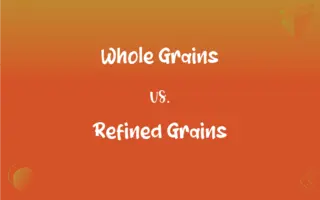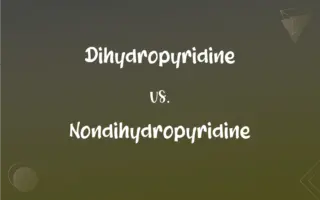Chemical Weathering vs. Mechanical Weathering: What's the Difference?
Edited by Aimie Carlson || By Janet White || Published on January 28, 2024
Chemical Weathering is the breakdown of rocks through chemical reactions, often altering the rock's composition. Mechanical Weathering is the physical breakdown of rocks into smaller pieces without changing their chemical composition.

Key Differences
Chemical weathering involves chemical reactions, such as hydrolysis, oxidation, and carbonation. Mechanical weathering is the physical disintegration of rocks through processes like frost wedging and thermal expansion.
Chemical weathering alters the chemical composition of rocks, often leading to new minerals. Mechanical weathering breaks rocks into smaller pieces but doesn’t change their chemical makeup.
Chemical weathering is influenced by factors like water, temperature, and air composition. Mechanical weathering is driven by physical factors like temperature changes, water, and wind.
An example of chemical weathering is limestone dissolving in acid rain. An example of mechanical weathering is the cracking of rocks due to freeze-thaw cycles.
Chemical weathering plays a crucial role in soil formation and landscape changes. Mechanical weathering contributes to rock erosion and sediment formation.
ADVERTISEMENT
Comparison Chart
Process
Chemical reactions
Physical disintegration
Composition Change
Alters chemical composition
Retains original composition
Influencing Factors
Water, temperature, air
Temperature changes, water, wind
Example
Limestone dissolving in acid
Rock cracking from freeze-thaw cycles
Geological Role
Soil formation, landscape alteration
Erosion, sediment formation
ADVERTISEMENT
Chemical Weathering and Mechanical Weathering Definitions
Chemical Weathering
Includes oxidation reactions.
Iron-rich rocks develop rust-like colors through chemical weathering.
Mechanical Weathering
Involves expansion and contraction due to temperature changes.
Desert rocks crack from thermal expansion in mechanical weathering.
Chemical Weathering
It alters the mineral composition of rocks.
Chemical weathering turned feldspar into clay.
Mechanical Weathering
Includes abrasion from wind or water.
River pebbles are smoothed by mechanical weathering.
Chemical Weathering
Chemical weathering breaks down rocks through chemical reactions.
Acid rain causes chemical weathering of marble statues.
Mechanical Weathering
Biological activity can contribute to mechanical weathering.
Tree roots growing in rock fissures cause mechanical weathering.
Chemical Weathering
Involves dissolving minerals in water.
Salt crystals form due to chemical weathering in arid regions.
Mechanical Weathering
Mechanical weathering is the physical breakdown of rocks.
Freeze-thaw cycles cause mechanical weathering in mountains.
Chemical Weathering
Carbon dioxide in water contributes to chemical weathering.
Limestone caves are formed by carbonation in chemical weathering.
Mechanical Weathering
Breaks rocks into smaller pieces without changing their composition.
Granite boulders crack into smaller pieces through mechanical weathering.
FAQs
What is mechanical weathering?
Mechanical weathering is the physical breakdown of rocks into smaller pieces without altering their chemical composition.
Which is faster, chemical or mechanical weathering?
The rate varies; chemical weathering is faster in warm, humid climates, while mechanical weathering is quicker in cold, dry climates.
What is chemical weathering?
Chemical weathering is the breakdown of rocks through chemical reactions that change their composition.
What are some examples of mechanical weathering?
Examples include frost wedging, thermal expansion, and abrasion by wind or water.
Do all rocks undergo chemical weathering?
All rocks can undergo chemical weathering, but the rate and extent vary based on their mineral composition and environmental factors.
Can plants cause mechanical weathering?
Yes, plant roots can grow into rock cracks and break them apart.
Is frost wedging a type of mechanical weathering?
Yes, frost wedging is a common form of mechanical weathering in cold climates.
How does water affect chemical weathering?
Water facilitates chemical reactions that lead to weathering, like hydrolysis and solution.
What factors speed up mechanical weathering?
Factors like temperature fluctuations, physical stress, and biological activity can speed it up.
Can pollution affect chemical weathering?
Yes, pollutants like acid rain can significantly increase the rate of chemical weathering.
How does carbonation occur in chemical weathering?
Carbonation occurs when carbon dioxide dissolved in water forms a weak acid that reacts with minerals.
Can mechanical weathering change the landscape?
Yes, over time it can significantly alter landscapes by breaking down large rocks.
What role does temperature play in chemical weathering?
Higher temperatures accelerate chemical reaction rates, increasing weathering.
How do humans impact chemical weathering?
Human activities like mining and pollution can accelerate chemical weathering.
Can chemical weathering release nutrients into the environment?
Yes, it can release nutrients like potassium and magnesium into the soil.
Does chemical weathering contribute to soil formation?
Yes, it plays a crucial role in breaking down rocks into minerals that form soil.
Is mechanical weathering more prevalent in certain environments?
Yes, it's more prevalent in environments with extreme temperature fluctuations and physical stress.
How do chemical and mechanical weathering work together?
They often work together, with mechanical weathering breaking down rocks and increasing the surface area for chemical weathering.
What is exfoliation in mechanical weathering?
Exfoliation is the peeling of rock layers due to thermal expansion and contraction.
Does mechanical weathering affect all rock types equally?
No, softer and more fracture-prone rocks are more susceptible to mechanical weathering.
About Author
Written by
Janet WhiteJanet White has been an esteemed writer and blogger for Difference Wiki. Holding a Master's degree in Science and Medical Journalism from the prestigious Boston University, she has consistently demonstrated her expertise and passion for her field. When she's not immersed in her work, Janet relishes her time exercising, delving into a good book, and cherishing moments with friends and family.
Edited by
Aimie CarlsonAimie Carlson, holding a master's degree in English literature, is a fervent English language enthusiast. She lends her writing talents to Difference Wiki, a prominent website that specializes in comparisons, offering readers insightful analyses that both captivate and inform.






































































